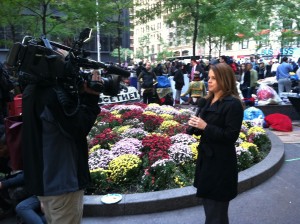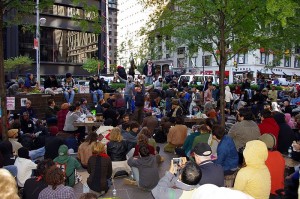Egypt
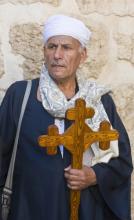
Muslim and Coptic Christian leaders in the U.S. are calling on the Egyptian government to exclude any mentions of Islamic law or language that discriminates against minorities in its draft constitution.
In an letter released Tuesday, the leaders urge the constitution writers to "recognize the equality of all Egyptians and to reject any language that would discriminate against any citizen of Egypt on the basis of that citizen’s religion or gender.”
Because Egypt is home to millions of Christians, attempts to describe Islamic law, or Shariah, as the source of the country’s law should also be rejected, the letter said.

Earlier this week, former President Jimmy Carter critiqued the United States for its (read: our) deteriorating record on human rights and rule of law in the last decade.
But those responding to Carter's New York Times Op-Ed (“A Cruel and Unusual Record”) have largely missed his main point. In the spirit of the Sermon on the Mount, Carter wants to lead America in removing the log from our own eye in hopes of honoring God and regaining our position as champions of human rights and rule of law.
During his visit to Cairo for the Egyptian elections, Carter met with the Grand Imam of Al Azhar — the most authoritative voice in Sunni Islam. Discussing human rights, religion, and the historic election that was taking place outside, Carter exhibited a rare humility in articulating his convictions. I feel that a whole range of human interactions might be improved if we would each remove the log from our own eye before trying to remove the speck from our neighbor’s.
Sitting with women’s rights activists and top Christian leadership; in private briefings and press conferences, this self-critique proved central to Carter’s efforts to build trust and advance human rights in Egypt and around the world.
After decades of lectures from the White House and U.S. State Department, much of the world has grown tired of the West’s wagging finger and “holier than thou” attitude. There may have been an era when this posture had a greater effect, but the U.S. has lost too much of its moral credibility in the wake of Abu Ghraib, Guantanamo, and drone strikes carried out against the President Obama's “Hit List”.
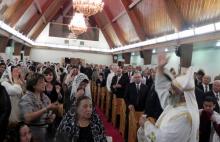
The fate of Copts looks as tenuous as ever as Egyptians struggle to determine who won this weekend's first-ever democratic presidential elections. Presented with what many saw as a lose-lose proposition, Egyptians had a choice between Ahmed Shafiq, former prime minister of ousted leader Hosni Mubarak, or Mohammed Morsi of the Muslim Brotherhood, who many fear will turn the country into an Islamic state.
Though final results are not yet in, the Muslim Brotherhood has projected its candidate as the winner. Within hours, Egypt’s military caretaker government, which is seen as sympathetic to Mubarak's old regime, issued an interim constitution that granted itself broad power.
Carl Moeller, who leads the Southern California-based Open Doors USA, an organization that works with persecuted Christians worldwide, estimates that approximately 100,000 Coptic Christians abandoned the country for the U.S. or Europe last year following the turbulence of the Arab Spring and attacks on Coptic churches.
CNN reports on worrying developments in Egypt:
"Egypt's highest court on Thursday declared the country's parliament invalid and cleared the way for a member of former President Hosni Mubarak's regime to run in a presidential election runoff this weekend.
The Supreme Constitutional Court ruled that parliament must be dissolved, state TV reported. An Egyptian constitutional law expert told CNN that following the court's decision, a political decision would be made about whether to dissolve parliament.
Following the ruling, Egypt's interim military rulers claimed to have full legislative control of government. Parliament had been in session for just over four months."
Christianity Today reports:
17 Coptic evangelical leaders met with five Muslim Brotherhood counterparts at the Brotherhood's headquarters on February 28, and crafted a joint statement of common values that both sides agree the new Egyptian constitution and government should uphold. Evangelicals comprise a minority of Egyptian Christians, almost 90 percent of whom are Coptic Orthodox.
Read more about this story here
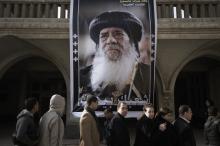
Tens of thousands of Coptic Christians mourned the death of Pope Shenouda III in a funeral mass at St. Mark’s Cathedral in Cairo. Thousands more, unable to get inside, crowded the streets outside the Cathedral. The rite was movingly chanted by bearded, black-robed priests and monks as mourners joined in and wept.
Following the mass, The Pope’s body was flown to Wadi al-Natroun, a fourth-century monastery in the northwest Nile Delta for internment.

Pope Shenouda led what many would call a biblical and spiritual life — the heartbeat of this ancient church. He loved the Bible, studying it thoroughly, memorizing vast passages, and teaching classes on its content — something unusual in the practices of this liturgical church. After becoming Pope in 1971, for many years he would teach from the Bible on a weekday night (I think it was always Wednesday) in St. Mark’s Cathedral in Cairo. He would schedule his world travels to be back in time for these Bible studies. The cathedral would be packed, and Pope Shenouda would patiently answer the questions raised by those coming to listen and learn.
When I first met Pope Shedouda in 2004, I was general secretary of the Reformed Church in America, leading a denominational delegation to the Middle East. At the close of our “audience” — a time of rich conversation — I presented him with a small travel Bible which had been printed by the RCA. It was the NRSV translation. He took it gracefully, but immediately looked up a particular verse in the New Testament that was of concern, and promptly announced that the NRSV’s translation was inaccurate.
The Bible Society of Egypt, which loved Pope Shenouda’s biblical emphasis, is using the occasion of his funeral this week to reach out to the society. Pope Shenouda’s call to ministry came in 1945, when he read a passage from the Bible in the window of a bookstore of the Bible Society of Egypt. The organization has prepared a pamphlet summarizing his life and love of the Scriptures, and printed 1,000,000 copies for distribution.
Today’s funeral will provide a focus of national attention of the extraordinary life of this church leader.
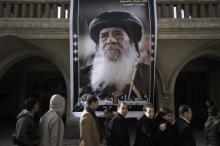
Egyptian Christians are mourning the death of Pope Shenouda III, the longtime leader of the Coptic Orthodox Church, who died on Saturday (March 17) at the age of 88.
His funeral will be on Wednesday (March 21) at St. Mark's Cathedral in Cairo, where his body has been sitting in state on a large wooden throne.
Tributes have come in from around the world, with Pope Benedict XVI offering prayers and President Obama praising Pope Shenouda as an "advocate for tolerance and religious dialogue."

One of my must reads is the Sunday New York Times Book Review. There are too many books being published that I would love to read, but don’t have the time. So, I rely on reading book reviews as one way of keeping in touch with what’s being written.
Last Sunday, the Review ran an essay on how books affect Washington policy makers. Lawrence Summers, former director of the National Economic Council, says that a good review can often summarize what’s necessary for a policy maker to learn. He was quoted as saying, “If you tell me that the policy makers are reading the reviews, not the books, I don’t take that as evidence that the books aren’t influential.”
While I don’t fancy myself as a policy maker, the sentiment is also true for the rest of us.
Learn about two such new titles that may have an impact on public policy inside the blog...
CAIRO, Egypt — From her home, Samia Ramsis holds a key chain bearing the face of the Virgin Mary as visitors outside come to look upon the spot where Egypt's Coptic Christians believe Mary, Joseph and the infant Jesus found refuge after fleeing Bethlehem.
Once crowded with Christians, Cairo's Coptic quarter where she lives with her husband, Mounir, and two children is now home to fewer than 50 Christian families.
"We know many Christians have left," said Mounir Ramsis, speaking not only about this quarter but about all of Egypt. "But we love this country and will stay until death."
The Arab Spring uprisings that toppled secular dictatorships have unleashed long-suppressed freedoms that have allowed Islamic parties to gain a share of political power they have been denied for decades. Their rise is creating near-panic among ancient Christian communities that dot the Muslim world and predate Islam by centuries.
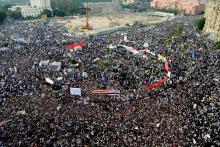
Today is one year to the day since protestors massed in Cairo's now-legendary Tahrir Square. Inspired by events in nearby Tunisia, hundreds of thousands of Egyptians called on their leader, Hosni Mubarak, to step aside and allow democratic reform to take place. The country, the city, the square, were (and remain) icons for what has become known as the Arab Spring.
The protests that began a year ago brought down a government that for too long had failed to care for its citizens in a manner that was good, decent and just. But in the time since, Egypt has walked a difficult path. How are Egyptians marking this poignant anniversary, how do they feel about the changes that have occurred, and what are their hopes for the years to come?
Here’s a round-up of some of the best insights into these questions from around the world:

In mid-December, the Religion Newswriters Association released its top 10 religion stories of the year.
The Associated Press now has its annual poll of U.S. editors and news directors and their choices for the top news stories of 2011.
Since this exercise is certainly a subjective one, your list might also be different from mine or the AP's. What would you add or delete from these lists?
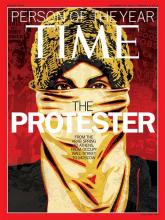
I love seeing who is chosen as TIME Magazine’s Person of the Year.
But sometimes TIME's honoree is not just a “Person.” Sometimes it’s “Persons” or even a thing.
Sometimes it’s the biggest news story of the year. Sometimes it encapsulates the zeitgeist, global urgings, or our collective mood.
This time around, it’s all of those things: A person, a group, a zeitgeist, a news story.
According to TIME, 2011 is the year of “The Protester.”
Initial results from Egypt’s first round of elections produced an unexpectedly large showing for Islamists. The Freedom and Justice Party of the Muslim Brotherhood gained approximately 37 percent of the seats selected from political party lists, in line with predictions. The real shocker was the 24 percent vote obtained by the al-Nur party of the Salafi movement. The Salafis are extreme conservatives who favor restrictions on the role of women and Saudi-style controls on public morality. Liberal-left parties in the various party blocs gained about 37 percent. The results are very preliminary, with two more rounds of voting still ahead.

A Decade Of Progress On AIDS (OPINION); States Fail In Fight Against Sex Trafficking; Newt Gingrich, The Savior Of The Religious Right?; Egypt’s Christians Prepare For New Political Climate; Occupy Protesters Consider Political Future; How Much High-Poverty Schools Get Cheated On Funding; Evangelist Billy Graham Hospitalized For Evaluation, Lung Treatment.

The huge throng filled the entire Square and was reminiscent of the historic mass mobilizations in February that brought down the Mubarak dictatorship. The rally was announced as a ‘million man march’ and was backed of a broad cross section of Egyptian activist groups, from liberal secularists to conservative Islamists. The Muslim Brotherhood did not support the march, although many of its youth members joined the crowd. The rally had a positive and hopeful spirit, in sharp contrast to the earlier violent clashes, which we witnessed on November 20.
The atmosphere in the Square on Friday was almost festive. We saw families with children, vendors selling food and drinks, face-painting on children (and thanks to a group of laughing teenagers, painted hands) and everywhere we saw the red, white, and black stripes of the Egyptian flag. It was a diverse crowd, young and old, women and men, middle class and the very poor. We were welcomed and greeted warmly by many.
The crowd was friendly but determined in its commitment to fulfill the promise of the revolution. There were no speeches, but constant chanting rose from groups throughout the Square, all with a similar message: Military rule must end.

As we gazed in shock at the battle below, Dr. Nadia quietly stepped back from the balcony.
We turned and saw her sitting alone in her office, hanging her head, shaking it from side to side in dejection. She had just said that the continued clashes were harming the revolution, that unknown forces were at work among the activists and in the military to undermine the revolution and prevent the transition to democracy.
No good can come from this, she said. Little could she have imagined that her words would be so quickly and horribly confirmed.
I had seen people my age start successful businesses, become pop-stars and even play a key role in partisan political campaigns, but I had never seen them develop and sustain a social movement.
Sure there have been more focused shifts around issues like educational equity, LGBT rights or global poverty that my generation has had a hand in shaping, but nothing that quite had the look or the feel of what I imagined the anti-War or Civil Rights movements of the 1960s to have been. I assumed we -- my contemporaries ( I'm 27) -- simply didn't possess the interest or the will-power to accomplish something that big.
I was wrong.
(+Video may contain coarse language+)
Indie music darling, Jeff Mangum, who rarely plays in public, surprised #OccupyWallStreet protesters in New York City earlier this week with an impromptu concert. A New Jersey singer-songwriter pens two songs for revolutions. And an order of Catholic nuns offer free mp3 downloads of a protest song inspired by the life of St. Francis of Assisi.
We've compiled a list of links where you can learn more about the genesis of the #OccupyWallStreet movement, including links to news reports, organizations involved in formenting the movement and local groups in every state where you can get involved close to home (if you don't live in Lower Manhattan.)
